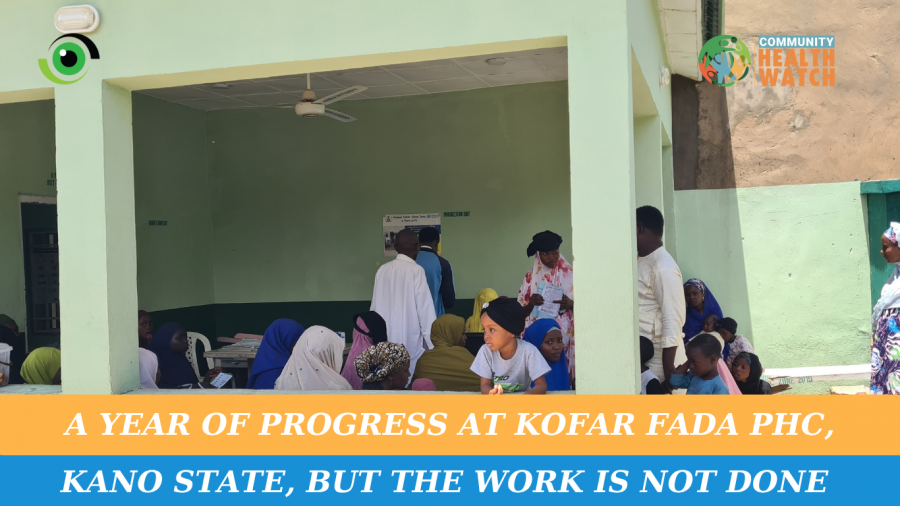
Hadiza Musa (Lead Writer)
According to Malam Isa Muhammad Abbas, the Chief Imam of Wudil, the women in the community feel uncomfortable being attended to by male health workers. “We need more female staff at our health centre,” he said during a town hall meeting in Wudil, Kano, which was organised by Nigeria Health Watch and the Kasham Girls Organisation back in October 2024.
A year later, his words, capturing the frustrations of many residents, became the spark for long-awaited change at the Kofar Fada Primary Healthcare Centre (PHC).
Just months later, in March 2025, the facility underwent renovation, and staff strength grew from fewer than four to 13 health workers, including a nurse, a midwife, 6 Community Health Extension Workers, 2 Junior Community Health Extension Workers, a laboratory attendant and support staff. The transformation restored the community’s confidence in the healthcare system, with the centre now recording up to 55 new pregnant women for antenatal care every Monday and around 10 women daily for family planning services.
According to Fatima Usman, the nurse in charge of the labour ward, “Women used to come for [only antenatal] and disappear before delivery, but now they return to give birth here because they know female staff are now available. Sometimes, we even deliver babies at night because we share our phone numbers during antenatal visits and most of us now reside close by.”
Zainab Habibu, a resident of Unguwar Danya, said the PHC now more convenient than going to the general hospital. “Before the renovation, we had to go far, but now it’s easier for us, especially when labour starts suddenly.”
Image credit: Nigeria Health Watch
However, the PHC operates only eight hours daily, limiting care during emergencies at night. Irregular medicine supply and insufficient beds remain persistent challenges, showing that the progress is real but incomplete.
Khadija Balarabe, another resident of Wudil, appreciates the changes but worries about gaps. “We still wait in long queues sometimes, and there are days we are told there are no medicines. We want the government to bring more supplies.”
Image credit: Nigeria Health Watch
Zainab Baba Idris, the assistant-in-charge, also affirms that more needs to be done to make the PHC’s operations more efficient. “We still lack beds, mattresses, and a scanning machine. If we have at least four more beds, it will help us save more lives.”
The town hall meeting proved transformative, prompting renovations, staff recruitment, and a renewed sense of community trust. Yet, gaps in equipment, drugs, and extended service hours continue to strain the PHC’s capacity.
Image credit: Nigeria Health Watch
This experience aligns with Nigeria’s Health Sector Renewal Plan, particularly its second pillar, which focuses on establishing an efficient, equitable, and high-quality health system. The progress seen in Wudil demonstrates that when communities are listened to, change can happen. However, it also highlights the urgent need to address ongoing service gaps.
The Wudil community urges policy makers and stakeholders to:
- Invest in essential equipment such as a scanning machine
- Procure more beds and mattresses
- Ensure a steady drug supply.
“Healthy mothers mean healthy communities,” Nurse Fatima said. “With more support, we can make Wudil PHC a safe haven for every woman.”
